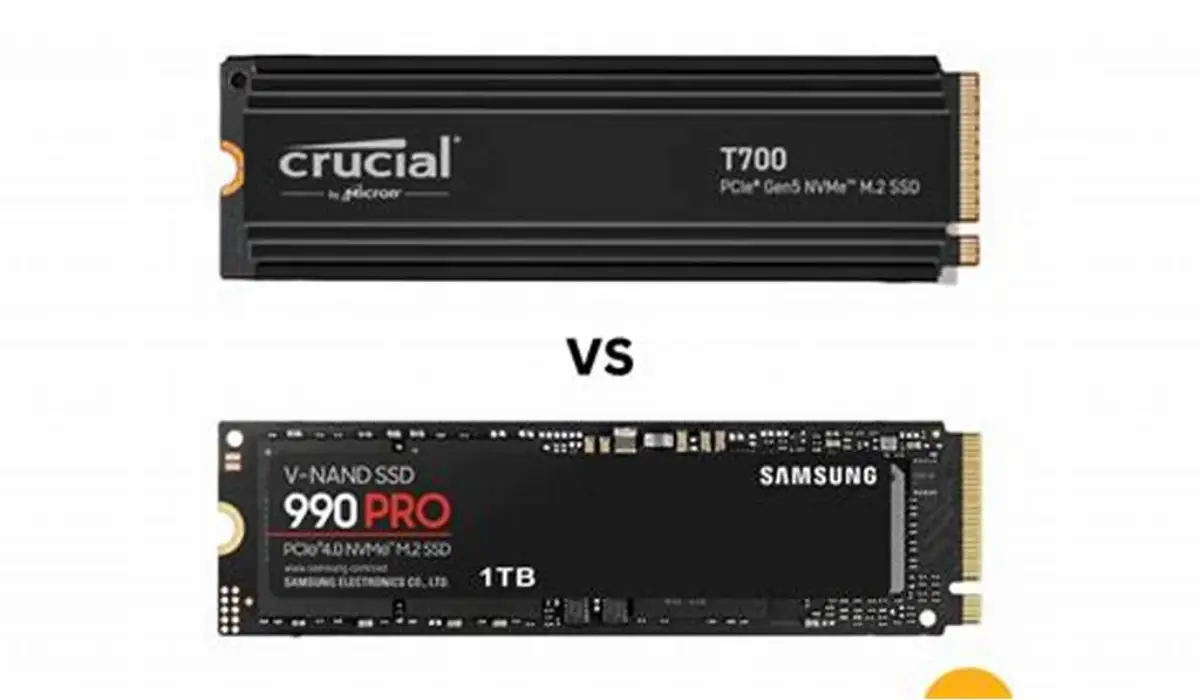When choosing an SSD for your PC performance, reliability and longevity are top of the list. Two of the most popular options out there are the Crucial P5 Plus vs Samsung 980 Pro. Both are PCIe 4.0 NVMe SSDs and are fast and efficient but which one is right for your system? In this article we’ll go through the features, pros and cons and differences between these two beasts. By the end you’ll know which drive is best for you.
Crucial P5 Plus vs Samsung 980 Pro
What is PCIe 4.0 NVMe?
Before we get into the Crucial P5 Plus vs Samsung 980 Pro showdown, let’s first understand what PCIe 4.0 NVMe means. PCIe (Peripheral Component Interconnect Express) is the interface standard for connecting high speed components like SSDs to your motherboard. NVMe (Non-Volatile Memory Express) is a protocol specifically designed for SSDs, it’s faster than traditional storage methods.
PCIe 4.0 doubles the bandwidth of PCIe 3.0, it can transfer data at up to 16 GT/s (gigatransfers per second). That means faster load times, quicker boot times and overall better system performance. Both the Crucial P5 Plus and Samsung 980 Pro are designed to use this bandwidth but which one uses it better?
Related: Samsung 980 Pro vs WD Black SN850X: Which to Choose?
Crucial P5 Plus
The Crucial P5 Plus is Crucial’s flagship PCIe 4.0 SSD. It’s designed for gaming, creative applications and demanding workloads. Here’s a quick rundown of its features:
- 500GB, 1TB and 2TB options.
- Up to 6600MB/s sequential read.
- Up to 5000MB/s sequential write.
- 600 TBW (1TB model).
- 5 year limited warranty.
The Crucial P5 Plus is built on Micron’s 3D NAND and has hardware encryption. It’s a great choice for those who want speed and security.
Samsung 980 Pro
The Samsung 980 Pro is Samsung’s answer to the PCIe 4.0 revolution. Samsung is known for their tech and this drive delivers high performance and reliability. Here are its features:
- 250GB, 500GB, 1TB and 2TB options.
- Up to 7000MB/s sequential read.
- Up to 5100MB/s sequential write.
- 600 TBW (1TB model).
- 5 year limited warranty.
Samsung is known for making reliable high performance SSDs and the 980 Pro is no exception. It’s powered by Samsung’s in-house Elpis controller and has V-NAND 3-bit MLC. It’s designed for demanding tasks.
Related: Samsung 970 EVO SSD vs Samsung 980 Pro SSD Specs
Performance: Crucial P5 Plus vs Samsung 980 Pro
When it comes to performance both the Crucial P5 Plus and Samsung 980 Pro deliver great results but there are some differences:
Read and Write Speeds
- Crucial P5 Plus: Up to 6600MB/s (read), 5000MB/s (write)
- Samsung 980 Pro: Up to 7000MB/s (read), 5100MB/s (write)
Both drives are fast but the Samsung 980 Pro is slightly faster in both read and write. So if you want the absolute fastest drive for data heavy applications like 4K video editing or large scale gaming the Samsung 980 Pro is the better choice.
Random Read/Write IOPS (Input/Output Operations Per Second)
IOPS is an important metric for SSDs as it measures how many read and write operations the drive can handle in a second. Higher IOPS means faster performance in everyday tasks.
- Crucial P5 Plus: Up to 720,000 IOPS (random read), 700,000 IOPS (random write)
- Samsung 980 Pro: Up to 1,000,000 IOPS (random read), 1,000,000 IOPS (random write)
The Samsung 980 Pro wins again. If you want lightning fast performance in multitasking environments the Samsung 980 Pro is the better choice.
Thermal Throttling
Another important factor in SSD performance is how well the drive handles heat. Both the Crucial P5 Plus and Samsung 980 Pro have thermal control features to prevent overheating.
- The Crucial P5 Plus has built-in dynamic thermal protection to keep the drive cool under heavy workloads.
- The Samsung 980 Pro has a nickel-coated controller and a heat spreader label to dissipate heat.
Both drives can maintain performance but the Samsung 980 Pro is better at handling sustained heavy workloads without throttling due to its better thermal management.
Endurance and Lifespan
Both the Crucial P5 Plus and Samsung 980 Pro have great endurance ratings so are suitable for users with heavy data writing needs.
- Crucial P5 Plus: 600 TBW (1TB model)
- Samsung 980 Pro: 600 TBW (1TB model)
In terms of endurance these drives are the same. Both have 5 year warranty so long term reliability is guaranteed.
Price
The biggest difference between the Crucial P5 Plus and Samsung 980 Pro is price. The Crucial P5 Plus is cheaper so is a great option for budget conscious users.
- Crucial P5 Plus: Cheaper, depending on capacity.
- Samsung 980 Pro: Slightly more expensive, more so for larger capacities.
If you want high performance SSD without the high cost the Crucial P5 Plus is the better value.
Related: How to Download and Install the Samsung 980 Pro Driver
Gaming Performance: Crucial P5 Plus vs Samsung 980 Pro
For gamers SSD performance can make a big difference in load times and overall system responsiveness. Both the Crucial P5 Plus and Samsung 980 Pro are great in gaming.
But since the Samsung 980 Pro is slightly faster in read and write speeds it may have a small edge in loading large game files or reducing in-game stuttering.
Which one is better for Content Creators?
For content creators working with large files, video editing or 3D rendering speed is key. Both the Crucial P5 Plus and Samsung 980 Pro are great options but the Samsung 980 Pro might be the better choice.
But the Crucial P5 Plus is a more affordable option with high performance so it’s a great choice for creators on a budget.
Power Consumption
Both drives are relatively power efficient but the Crucial P5 Plus consumes less power than the Samsung 980 Pro. If you want to optimize your system for power efficiency this could be a factor to consider.
Software and Features
- Crucial P5 Plus comes with Crucial’s Storage Executive software which has tools to monitor drive health and performance and firmware updates.
- Samsung 980 Pro comes with Samsung’s Magician software which has a full suite of management tools including performance optimization, data migration and diagnostic tools.
Both software is user friendly and has useful features to keep your SSD healthy.
Crucial P5 Plus vs Samsung 980 Pro: Which one to choose?
Choosing between the Crucial P5 Plus and Samsung 980 Pro ultimately boils down to your needs and budget.
- If you want the best in terms of speed and performance the Samsung 980 Pro is the clear winner. Its faster read/write speeds and better thermal management makes it suitable for heavy use like gaming, content creation and large data processing.
- If you want high performance SSD with great value for money the Crucial P5 Plus is a great option. It has great speeds and reliability at a lower price so it’s perfect for everyday use or budget conscious buyers.
Both the Crucial P5 Plus and Samsung 980 Pro are high end SSDs that’s great for many uses. Whether you’re gaming, video editing or just want to upgrade your system’s storage either of these drives will fit your needs. The Crucial P5 Plus excels in affordability and power efficiency while the Samsung 980 Pro leads in raw performance and thermal management.
FAQs for Crucial P5 Plus vs Samsung 980 Pro
- Is the Samsung 980 Pro better for gaming than the Crucial P5 Plus?
Yes, the Samsung 980 Pro is slightly faster. - Does the Crucial P5 Plus support encryption?
Yes, the Crucial P5 Plus has hardware encryption. - Which one has better thermal management?
The Samsung 980 Pro has better thermal management with its nickel coated controller and heat spreader. - Are both SSDs PCIe 3.0 compatible?
Yes, both Crucial P5 Plus and Samsung 980 Pro are backward compatible with PCIe 3.0 but you won’t get the full speed benefits if you use them with a PCIe 3.0 slot. - Which one has better value?
Crucial P5 Plus. cheaper. Period.



